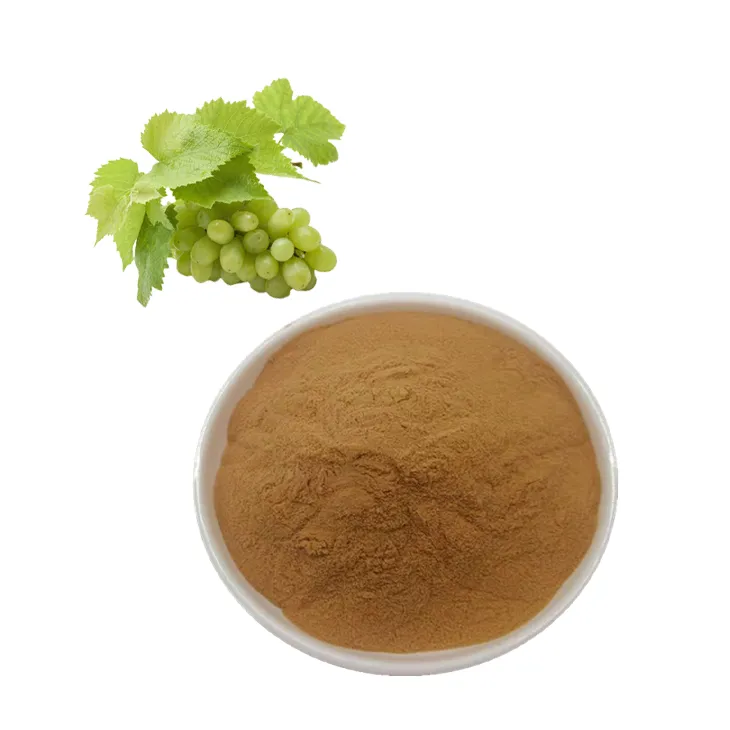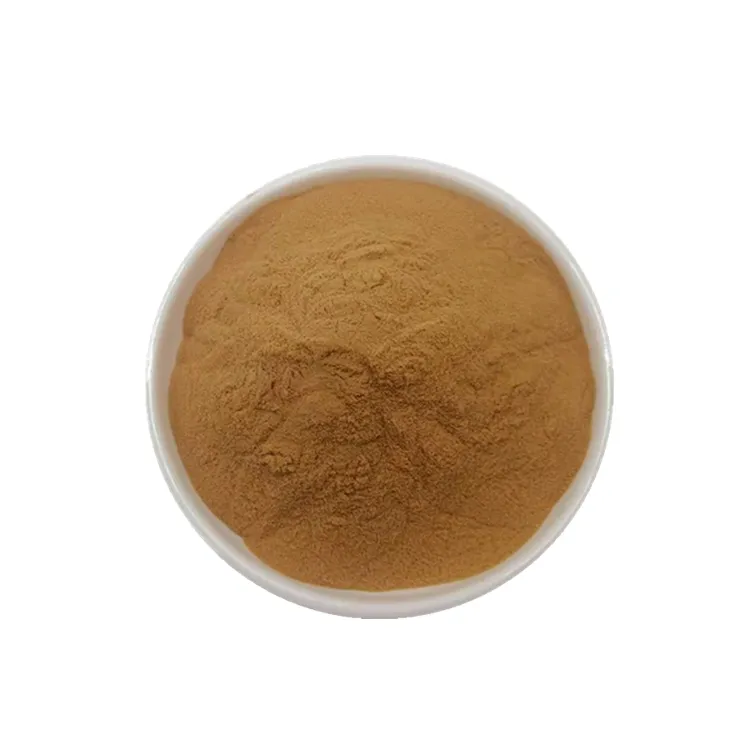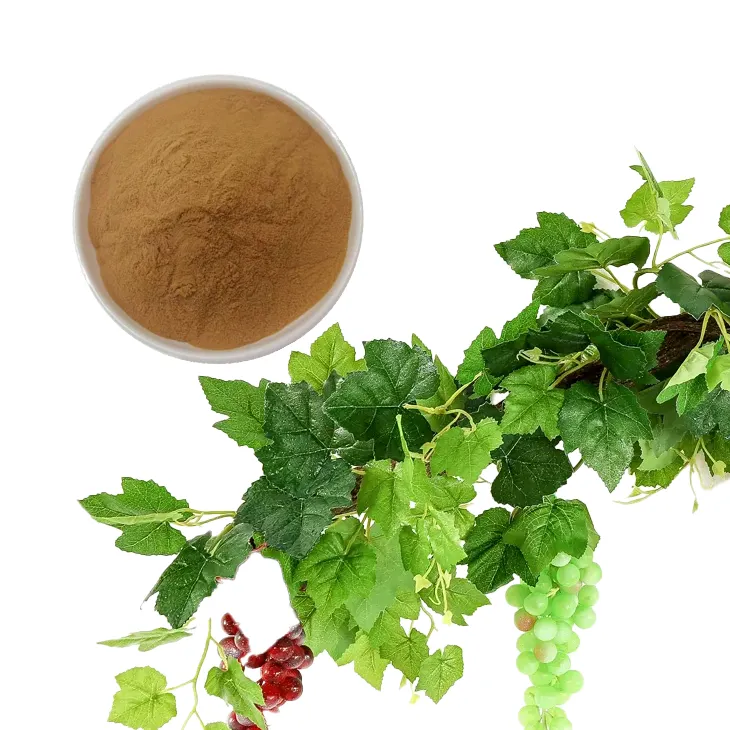- 0086-571-85302990
- sales@greenskybio.com
Grape Leaf Extract: Benefits and Consumption Guide
2024-11-13

1. Introduction
In recent years, the search for natural supplements with various health benefits has been on the rise. One such supplement that has been gaining attention is Grape Leaf Extract. Derived from the leaves of the grapevine, this extract is rich in a variety of bioactive compounds that can potentially offer numerous advantages to human health.

2. The Nutritional Composition of Grape Leaf Extract
Grape Leaf Extract contains a diverse range of nutrients and bioactive substances. It is a good source of polyphenols, which include flavonoids such as Quercetin and rutin. These flavonoids are known for their antioxidant properties. Additionally, it may also contain tannins, which have been associated with various health - promoting effects.

3. Health Benefits of Grape Leaf Extract
3.1 Immune System Enhancement
The antioxidants present in grape leaf extract play a crucial role in strengthening the immune system. They help in neutralizing free radicals in the body, which can otherwise cause oxidative stress and damage to cells. By reducing oxidative stress, the immune cells can function more effectively, enabling the body to better defend against infections and diseases.
3.2 Digestive Health Promotion
Grape leaf extract can have a positive impact on digestive health. It may help in regulating bowel movements and improving the overall function of the digestive tract. The tannins in the extract have been shown to have astringent properties, which can be beneficial for soothing the digestive system and reducing inflammation in the gut.
3.3 Anti - Inflammatory Effects
The flavonoids and other bioactive compounds in grape leaf extract possess anti - inflammatory properties. Chronic inflammation is associated with many diseases, such as heart disease, diabetes, and certain cancers. By reducing inflammation, grape leaf extract may contribute to the prevention and management of these chronic conditions.
3.4 Cardiovascular Health
There is evidence to suggest that grape leaf extract can be beneficial for cardiovascular health. It may help in reducing blood pressure, improving blood lipid profiles (such as reducing LDL cholesterol levels), and preventing the formation of blood clots. These effects are likely due to the combined action of the antioxidants and other bioactive substances in the extract.

4. Consumption Guide
4.1 Recommended Daily Intake
The recommended daily intake of grape leaf extract can vary depending on several factors, such as age, health status, and the specific purpose of consumption. Generally, for adults, a daily dose of 100 - 500 mg of grape leaf extract is considered safe and may provide health benefits. However, it is always advisable to consult a healthcare professional before starting any new supplement regimen.
4.2 Forms of Grape Leaf Extract
Capsules: Capsules are one of the most common forms of grape leaf extract. They are convenient to take and can be easily incorporated into a daily routine. Each capsule typically contains a standardized amount of the extract, ensuring consistent dosing.
Tinctures: Tinctures are liquid extracts that are usually taken by diluting a few drops in water or another beverage. They are absorbed relatively quickly in the body, but the taste may be a bit strong for some people.
Teas: Grape leaf tea can also be made by steeping dried grape leaves in hot water. This is a more natural and traditional way of consuming grape leaf extract. However, the concentration of active compounds in tea may be lower compared to capsules or tinctures.
4.3 Precautions during Consumption
- Allergic Reactions: Some individuals may be allergic to grape products. Before consuming grape leaf extract, it is important to check for any signs of allergy, such as skin rashes, itching, or swelling. If an allergic reaction occurs, discontinue use immediately and seek medical attention.
- Drug Interactions: Grape leaf extract may interact with certain medications. For example, it may potentiate the effects of blood - thinning medications, increasing the risk of bleeding. Therefore, if you are taking any prescription medications, it is essential to inform your doctor before starting grape leaf extract.
- Pregnancy and Breastfeeding: There is limited research on the safety of grape leaf extract during pregnancy and breastfeeding. As a precaution, it is best to avoid using it during these periods unless recommended by a healthcare provider.
5. Conclusion
Grape leaf extract is a promising natural supplement with a range of potential health benefits. However, like any supplement, it should be consumed with caution. By understanding its benefits, recommended intake, and taking appropriate precautions during consumption, individuals can make an informed decision about whether grape leaf extract is suitable for them. As research in this area continues to evolve, more insights into the full potential of grape leaf extract are likely to emerge.
FAQ:
What are the main benefits of grape leaf extract?
Grape leaf extract has several main benefits. It may help in enhancing the immune system, which means it can potentially make our body more resistant to diseases. It also promotes digestive health, which can assist in better digestion and absorption of nutrients in our body.
What is the recommended daily intake of grape leaf extract?
The recommended daily intake of grape leaf extract can vary depending on factors such as a person's age, health condition, and the specific form of the extract. However, generally, it is often recommended to start with a small amount, usually around 100 - 500 mg per day, and adjust according to individual response. It is always best to consult a healthcare professional for personalized advice.
What are the best forms to consume grape leaf extract?
There are several good forms to consume grape leaf extract. Capsules are a convenient option as they are easy to take and the dosage is pre - measured. Tinctures are also popular. They are liquid extracts that can be easily absorbed by the body. Another form could be powder, which can be mixed with drinks or food. However, the choice may depend on personal preference and ease of use.
Are there any side effects when consuming grape leaf extract?
While grape leaf extract is generally considered safe for most people when consumed in appropriate amounts, some people may experience mild side effects. These can include digestive discomfort such as nausea or diarrhea. In rare cases, allergic reactions may occur, especially in those who are allergic to grapes or related products. It is important to stop use if any adverse reactions are noticed and consult a doctor.
Can everyone consume grape leaf extract?
Not everyone can consume grape leaf extract without caution. Pregnant and breastfeeding women should be especially careful as there is not enough research on its safety during pregnancy and lactation. People with certain medical conditions, such as bleeding disorders or those taking medications that may interact with the extract, should also consult a healthcare provider before starting to take it.
Related literature
- The Health Benefits of Grape Leaf Extract: A Comprehensive Review"
- "Grape Leaf Extract: Composition, Pharmacological Properties, and Therapeutic Applications"
- "Safety and Efficacy of Grape Leaf Extract in Nutritional Supplements"
- ▶ Hesperidin
- ▶ Citrus Bioflavonoids
- ▶ Plant Extract
- ▶ lycopene
- ▶ Diosmin
- ▶ Grape seed extract
- ▶ Sea buckthorn Juice Powder
- ▶ Fruit Juice Powder
- ▶ Hops Extract
- ▶ Artichoke Extract
- ▶ Mushroom extract
- ▶ Astaxanthin
- ▶ Green Tea Extract
- ▶ Curcumin
- ▶ Horse Chestnut Extract
- ▶ Other Product
- ▶ Boswellia Serrata Extract
- ▶ Resveratrol
- ▶ Marigold Extract
- ▶ Grape Leaf Extract
- ▶ New Product
- ▶ Aminolevulinic acid
- ▶ Cranberry Extract
- ▶ Red Yeast Rice
- ▶ Red Wine Extract
-
Camu Camu Extract
2024-11-13
-
Lemon Balm Extract
2024-11-13
-
Agaricus Blazei Extract
2024-11-13
-
Garcinia Cambogia Extract
2024-11-13
-
Sophora Flavescens Root Extract
2024-11-13
-
Propolis Extract Powder
2024-11-13
-
Hawthorn powder
2024-11-13
-
Longan Extract
2024-11-13
-
Saw Palmetto Extract
2024-11-13
-
Giant Knotweed Extract
2024-11-13





















